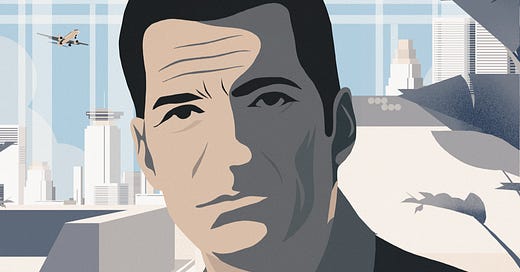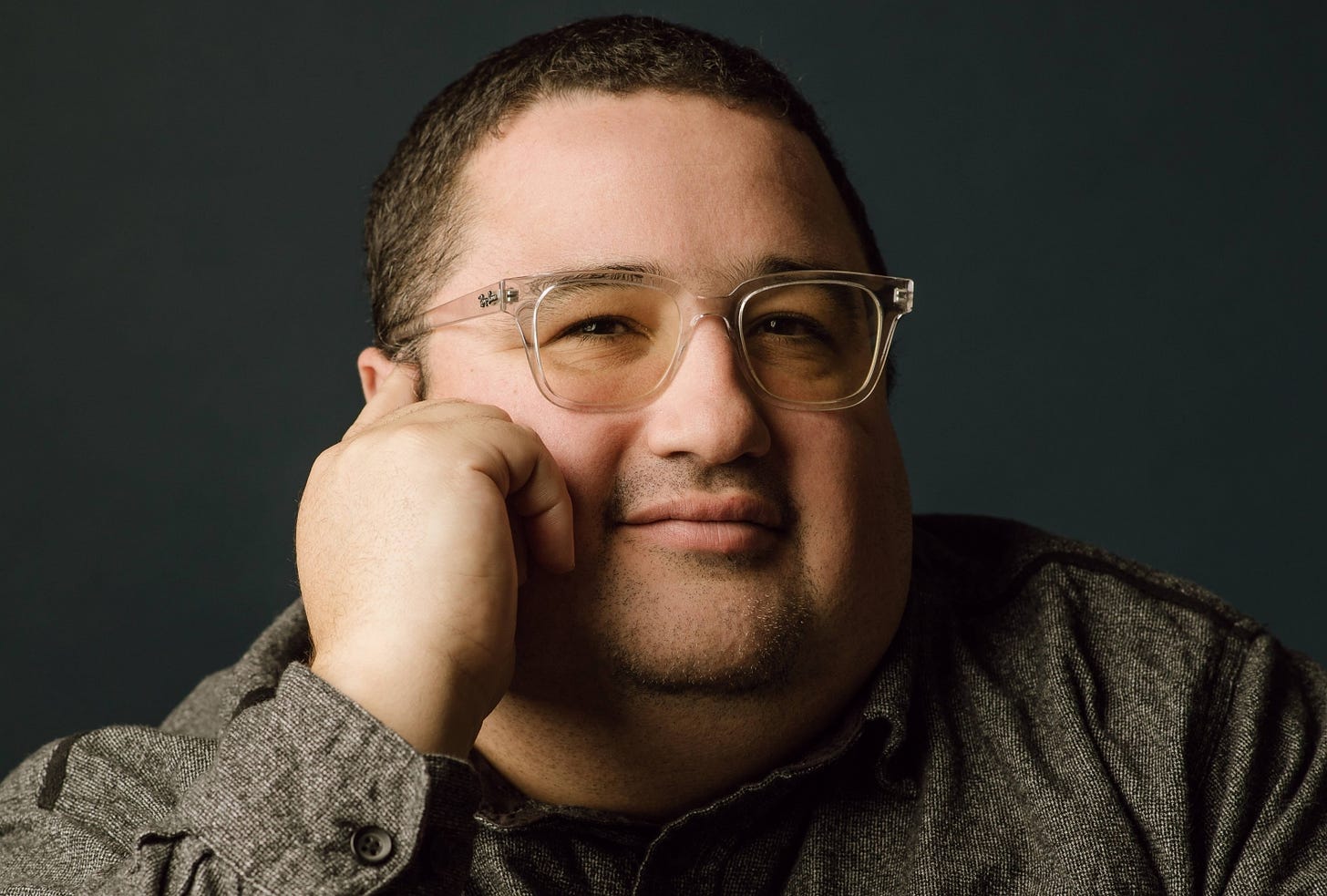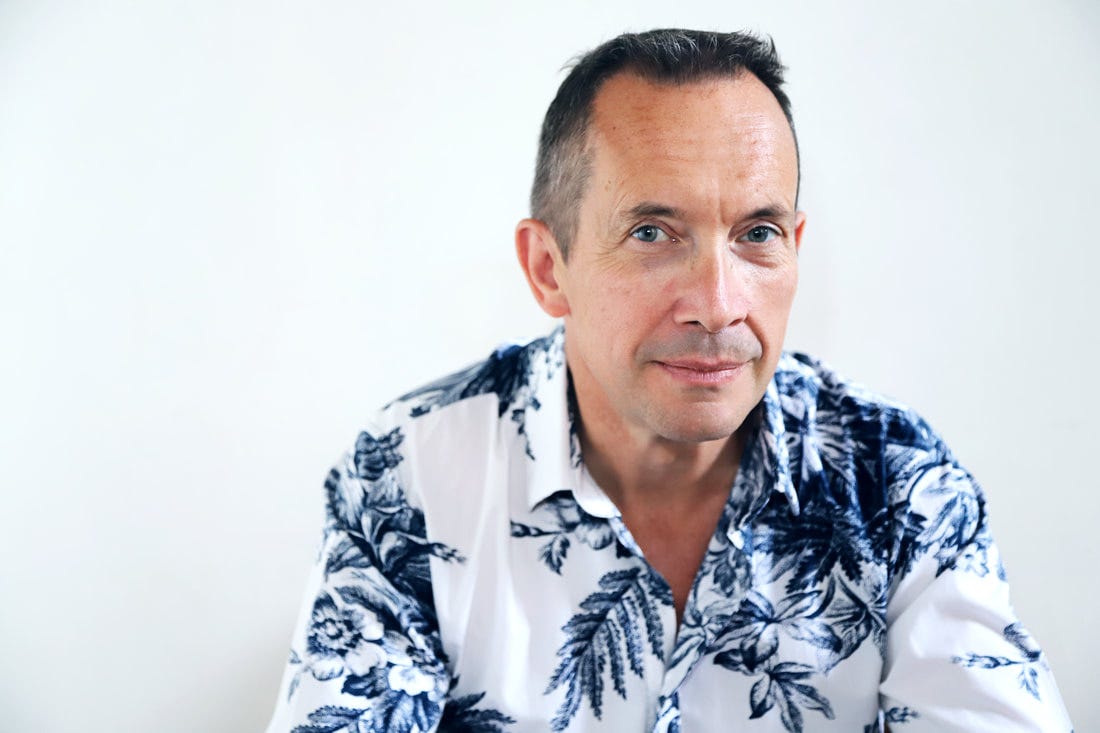
Ashley Daniel Foot:
We're Inside Vancouver Opera and I'm Ashley Daniel Foot. Today we'll explore how composer Jonathan Dove turned an airport terminal into a mythic space of drama, humor, and humanity - transforming the ordinary into the extraordinary. In 1988, an Iranian refugee named Mehran Karimi Nasseri found himself trapped in Charles de Gaulle Airport. He stayed there for 18 years, and his story would inspire Steven Spielberg's The Terminal. But before, it was Jonathan Dove who first saw its operatic potential. As Vancouver Opera prepares to take Flight from February 8th to 16th at the Queen Elizabeth Theatre, today we're thrilled to talk with the composer himself, Jonathan Dove.
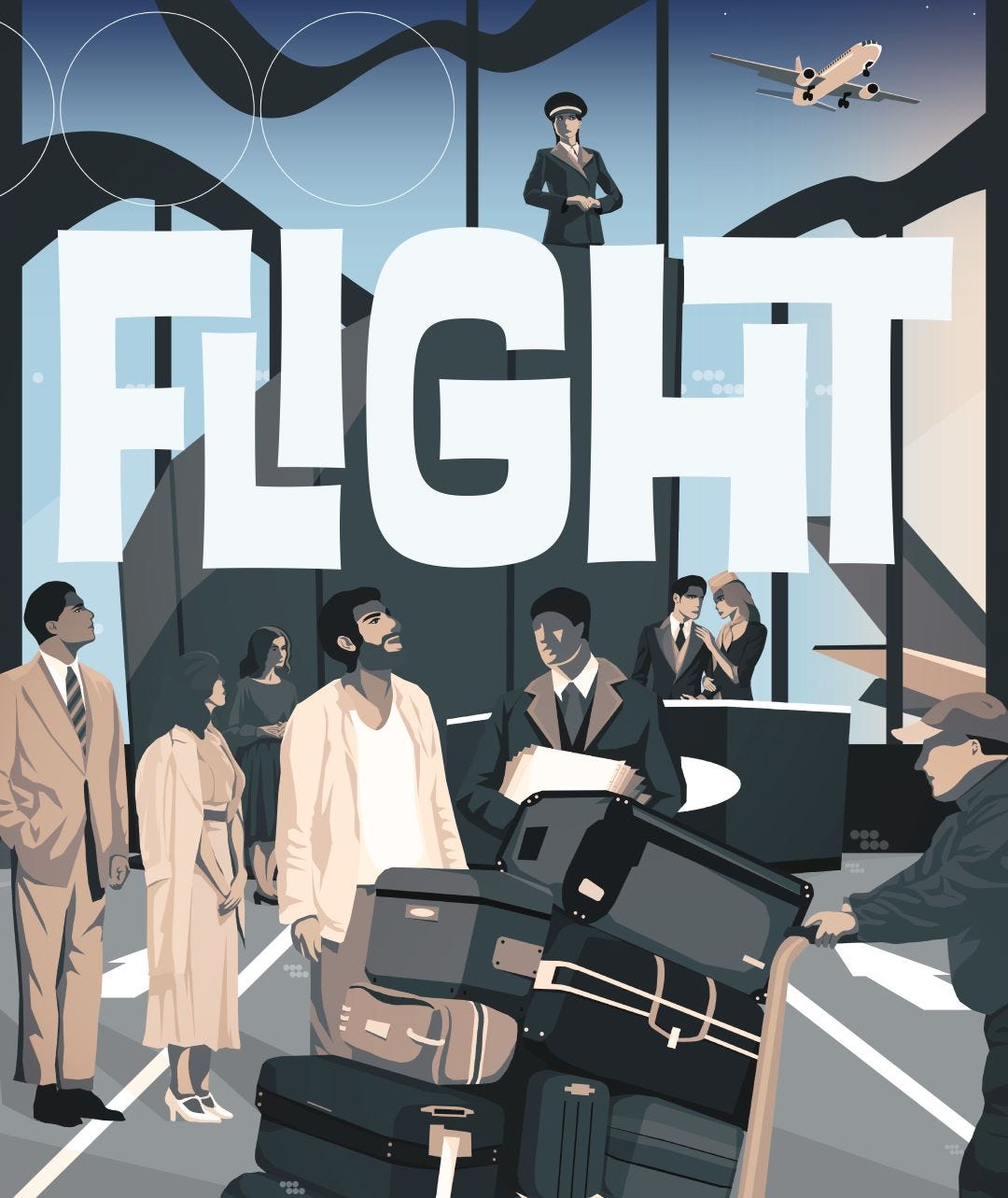
Jonathan Dove:
I sing everything that I write for voice and in operas, I'm singing every part. I'm also therefore acting. I've realized recently how much of the job really is acting and I'm finding out, well, how do I want to sing these words, but also if this is what I'm singing, what does the accompaniment need to be?
Ashley Daniel Foot:
Jonathan is one of Britain's most celebrated contemporary composers, renowned for making opera vibrant and accessible. Born in London, Jonathan's early exposure to music through piano, organ, and viola shaped his passion for composition. Jonathan's work bridged professional and community performance. He's known for choral and orchestral music, including a commission for the BBC Proms in King's College, Cambridge. Honoured with an Ivor Novello Award and a Commander of the British Empire, Jonathan Dove continues to captivate audiences with music that celebrates the human spirit.
Jonathan Dove:
So I'm trying to kind of summon up what I'm going to need from the orchestra, and I inhabit each character in turn. When I finished, I sing it through to my collaborators. I mean, typically the producer, the conductor, the director, the librettist. But actually when I wrote Flight, because it was quite early in my composing life, I had already written three large-scale community operas and a couple of chamber operas.
But it was the first time I'd written for the main stage with a full symphony orchestra and only professional soloists. And so I sang that through to quite a few groups of friends. I sang it through to anyone who would listen scene by scene, and then an act at a time, and that was so helpful. Nowadays, I think I can do my own feedback a lot of the time, I record myself singing through a new piece and listen back to it as if it were written by somebody else.
Ashley Daniel Foot:
And you're at the piano as well, right? Is that fair to say, self-accompanied?
Jonathan Dove:
Yes!
Ashley Daniel Foot:
When I hear you say that, there's a certain generosity that I can imagine would come by doing such a thing, do you feel like that builds, I don't know if I want to use the word empathy, but what do you think that does to the creation of these characters and their ultimate voices as you have to give voice to them yourself in the room?
Jonathan Dove:
One straightforward thing is that I know that everything can be sung.
When I wrote Flight, I still had enough falsetto to be able to sing the Refugee's part as written. I can't get all those notes now. And the Controller, I think I could do quite a good impression of. Now, if I'm writing that high, I probably whistle apart.
Ashley Daniel Foot:
Oh, I love it!
Jonathan Dove:
I can't sing quite that high anymore. So there's something about just about the practicality, but then I think you're also suggesting there is something about the character and there's another level, which is knowing the singer that I'm writing for, which is often the case. And with Flight, I knew all of the singers. I hadn't worked with all of them before, but I worked with them while I was writing. So I had their sound in my mind. And I think that sometimes makes me work a bit harder, and I think, oh, but if they're singing, she's got this amazing note and I'd really love to use that.
Ashley Daniel Foot:
When I'm thinking about Flight, it's such a specific and truly extraordinary story. One man stranded in an airport terminal for 18 years, you transform it into something almost universal. How did it go from that story? And I guess I'm asking you, what drew you to Flight and what was the moment that you realized it was going to sing?
Jonathan Dove:
I was working with April De Angelis, the librettist, and I wanted to work with her because she makes me laugh. And we'd written two tiny pieces before, and I felt that there was a shortage of comedy in the opera world because really during the whole of the 20th century, there was almost no comedy. And of course, there are amazing comedies in the late 18th, early 19th centuries and even later in the 19th century with Falstaff and Verdi. But then comedy leaves the room really during the 20th century.
That was my first thought, it was about something funny. April and I were looking at particularly Mozart operas, and I showed her the Marriage of Figaro and Così fan tutte. And so we were talking about couples who end up with the wrong partner and those sorts of common devices. And then she came across the story of the refugee living in Charles de Gaulle. And immediately I wanted to hear planes taking off and landing, but I also thought, what an extraordinary situation to be in. Then there's the experience of going to the airport and maybe you check in your luggage, so you're then kind of floating. You haven't got all of your possessions.
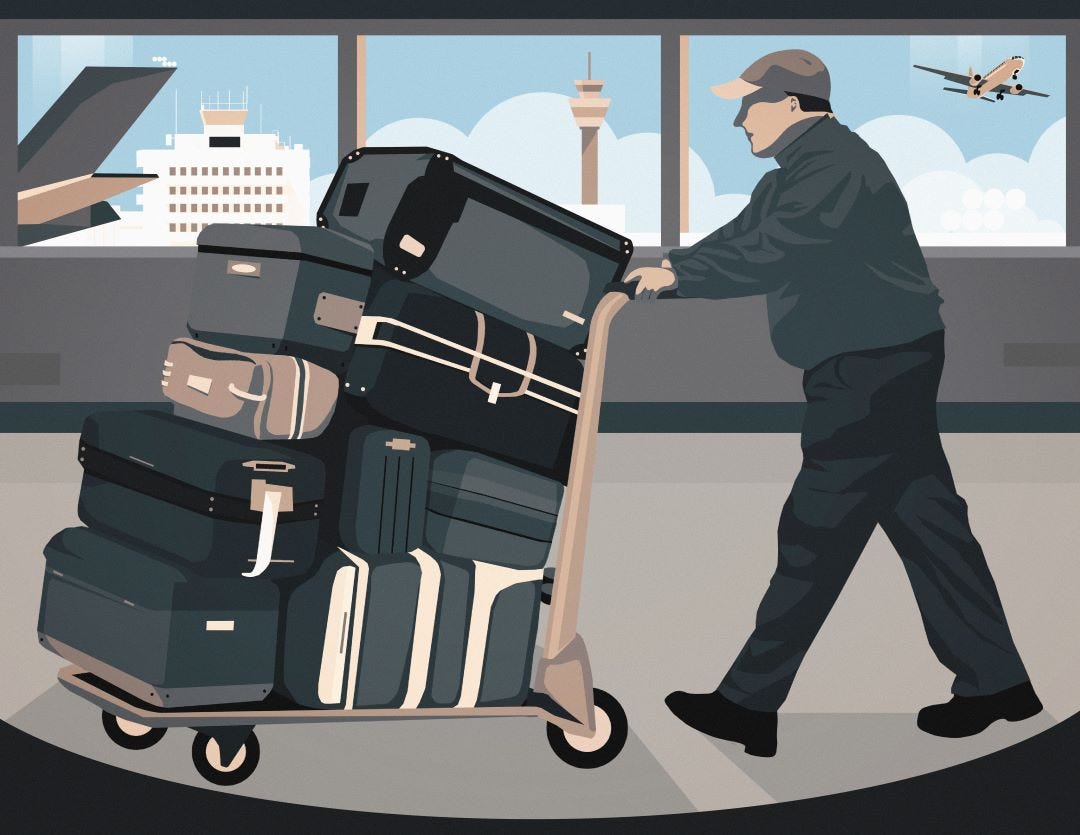
Ashley Daniel Foot:
It's a liminal space.
Jonathan Dove:
Yes, there's this little passage where you could be anyone in the departure land.
Ashley Daniel Foot:
Thinking about the refugee, a man who cannot leave, who cannot move, defined by stillness. When you were starting to sing all these characters at your piano as you were composing April's story, how did you approach that concept of stasis, but also the interior journey?
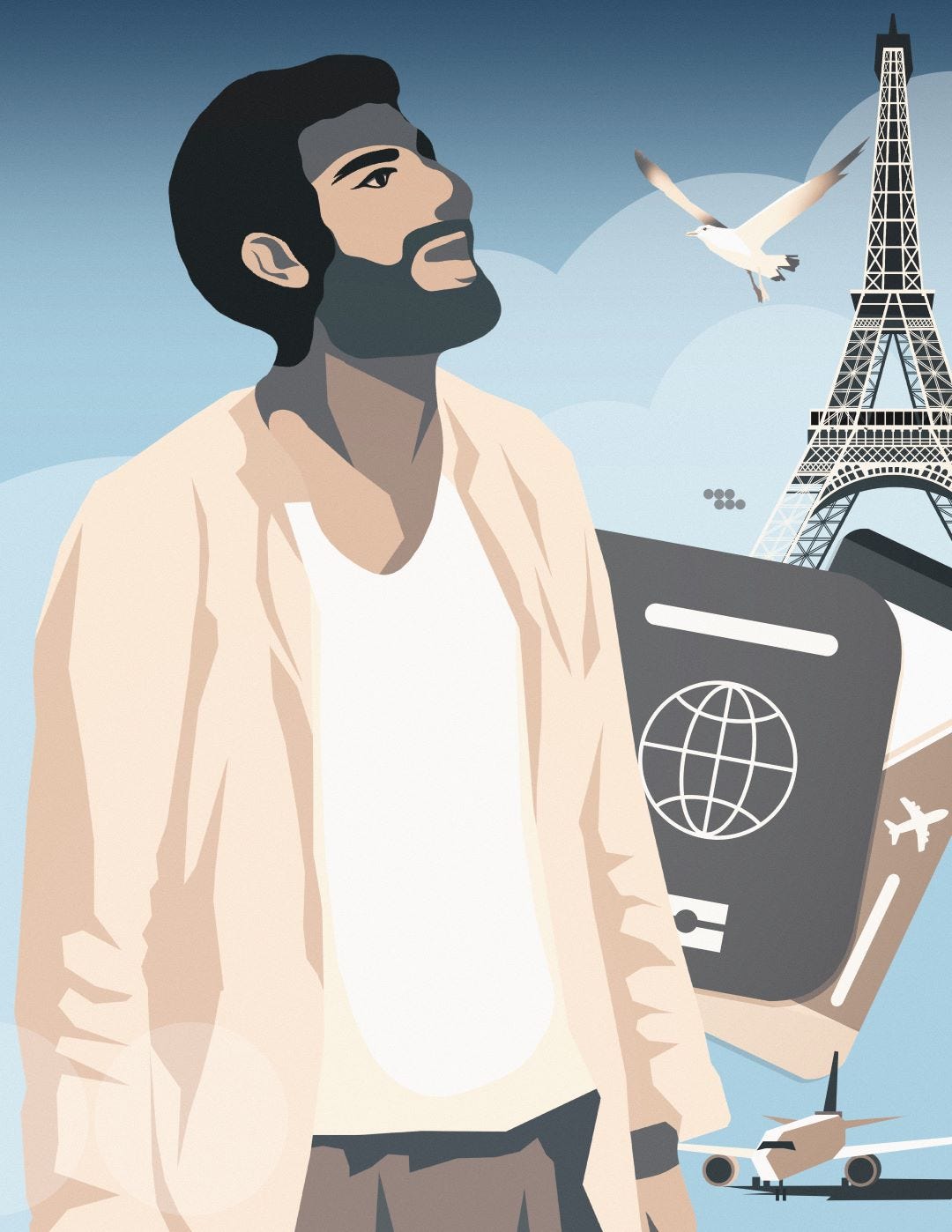
Jonathan Dove:
The scale of his journey I guess I didn't fully confront until he tells his story right at the end of the opera, and that's when we hear how he's arrived in this airport. And I should say that the refugee in Flight is not exactly Mehran Nasseri, the Iranian refugee. He's inspired by him, but the refugee's story in the opera is different how he arrived, but he's predicament is the same that he's not allowed into the country, although thanks to a kind of bureaucratic mercy, he is not immediately expelled from the country.
So that's how he ends up trapped in his limbo. I think I was focusing initially on a sense of his being really very other. In the opera, we don't hear exactly where he's from, but we know that he's different from everyone else and that his reason for being in the airport is different. And that's why I chose the countertenor voice. It sounds it's noticeably different from the other male voices, but it also interestingly puts his voice right in the center of the texture.
Ashley Daniel Foot:
It really does.
Jonathan Dove:
So he's in the centre of the opera and the centre of the sound, and I was looking for, I suppose, a sort of harmonic territory that seemed to belong to him and ended up coming up with a scale that I've never used before lot, but I have used it since because it has qualities that I like. And so it's an unusual collection of intervals, and it certainly doesn't sound European or Western. So it's got these quite awkward sort of odd leaps in it.
There's some quite large intervals, but more semitones together than I usually use. So it's got many properties that scale. It's got major and minor, but it's a slightly eerie sound, I think. I find the business of writing operas stories make demands on you, and so I find myself trying to find a new tuning.
I think in scales, I suppose, and sometimes they're clearly those scales belong keys that we're familiar with. And a lot of my music, it sounds tonal. Particularly I think about scales like the different ways that you can tune a harp and that different characters want different tunings.
Once I discover a particular scale for a character, it often becomes part of my repertoire, and then I might return to it in a quite different context. And I've used the refugee scale sometimes for stars, things that are not immediately obviously related to the refugee, but it had this very strong feeling of, I suppose, mystery, some sadness and a feeling of otherness in this scale as well.
Ashley Daniel Foot:
I think so. And it's funny, when I think about your music, I often think of it as architectural just in the way that it explores space. And I did look at your biography and I noticed that your father was an architect and I wanted to ask about how the approach to building spaces, maybe his approach to building spaces influenced the way that you build music. Do you think there's such an easy comparison as that, or am I reaching?
Jonathan Dove:
Well, the thing that I... Because it's not only my father, but actually my mother was an architect, and my brother and sister and brother-in-law are all architects.
Ashley Daniel Foot:
The family business!
Jonathan Dove:
Exactly that. I'm actually the only one who isn't an architect. There are all kinds of parallels you can draw, but the thing that strikes me is that what we do, what I do, and they do, is to create structures for people to live in. And in my case, the structures are particularly the singers I'm thinking of. And I think that the way that different individuals occupy a building and the choices they make and the distinctive things they do that no one else would think of doing in that particular house, the way they've decorated, the way they use the certain rooms is parallel to the way that each singer brings something different to a role. So they're using the same notes and the same rhythms, but they find different qualities in them, and they're bringing their own life to the piece. So I think that's what we have in common.
Ashley Daniel Foot:
I want to talk briefly about the concept of migration. And written in the '90s, I think this is a topic that's all the more relevant, hasn't changed and has become more urgent than ever. Do you think your perspective on the refugees story has evolved since you wrote it?
Jonathan Dove:
I feel that we're more sensitized to the plight of refugees. And again, in Europe we're painfully aware that people are making such dangerous crossings. They're not always surviving from everything we understand about the potential future impact of climate change, I believe it's actually in the sense that it's happening already, but as the parts of the world become less habitable and conditions there become less congenial to put it mildly, people are forced on the move. So it's something that's likely to increase. So it feels like it's much more in our minds generally now, it's my feeling than when I wrote it in weirdly, Flight seems more topical now than it did 25 years ago.
Ashley Daniel Foot:
Oh, I completely agree. Do you think that opera therefore then has a unique power that other art forms doesn't reflect stories of these topics?
Jonathan Dove:
Of course this story has not only appealed to an opera composer because after I'd written the opera, I discovered that Steven Spielberg was making a movie, which I think is probably more faithful to Mehran Nasseri's story.
Ashley Daniel Foot:
It's a very different beast. Yeah, absolutely.
Jonathan Dove:
Yeah. It's a story of our time. I don't think people expect opera to be contemporary and topical, and that makes it perhaps more exciting to write in that way. My feeling is that life is operatic and our own lives are, and opera is, if you like, a way of looking at the world. I think certainly things are happening all the time around us that have the potential to be an opera.
Ashley Daniel Foot:
Now more than ever, I would argue. Yes.
Jonathan Dove:
My most recent opera, which will be opening, it's a community opera, which will be in Glyndebourne in February, is inspired by the School Strikes, the Friday for the Future movement and attempts to look into the future and imagine a future where, what would it be like if we had done all the right things? And that certainly opera feels absolutely the medium for that. I think it's a great place for sharing feelings. I think when you arrive in a theatre, you are a whole lot of individuals, but the experience of sharing these sensations, sharing the vibrations in the air together and breathing together to some extent means that an audience comes together. We become an audience through that experience.
Ashley Daniel Foot:
I totally agree. There's something beautiful about creating music that feels like it belongs to everyone. And I want to ask you about a phrase that you just said, a community opera. What is a community opera, Jonathan?
Jonathan Dove:
For me, a community opera is one where the community participates. So there are many singers from the community, and typically there might be a couple of hundred performers involved.
The first few that I did were in spaces outside of the opera house. They were actually, the first three were for Glyndebourne, which is an opera house in South East England that then went on to commission Flight. But those operas happened in, one was in the ballroom at the end of a pier in Hastings Pier, which has since been burned down, so it doesn't exist anymore. There was another one in a sports center, and the last of those three, which had 600 performers in it. And that started off in the cathedral in Peterborough. At one point a samba band burst into the cathedral and kind of lured the audience out across the market square and into an enormous shopping mall where, well, angels in the form of children were coming singing down the escalators.
Ashley Daniel Foot:
Good gracious!
Jonathan Dove:
When I first started working with opera companies, I was playing the piano for rehearsals and things.
Ashley Daniel Foot:
And this is back in Glyndebourne, right?
Jonathan Dove:
Yes. And before, but at Glyndebourne I was assistant chorus master, but I was doing outreach workshops there. So we were engaging with mainly school groups there. But sometimes I remember working with a different opera company, Opera North. We did a project where we would work in a school with a group who would be taken off their timetable for the whole week, and we would make up an opera in a week and perform it at the end of the week.
Ashley Daniel Foot:
Jonathan Dove:
So I'd had this experience of a sort of shared devising and sharing the act of composing, seeing what we can do together. So you find ways of improvising as a group, finding ways of choosing ideas that you particularly like from things that you've come up with as a group. The sort of Road to Damascus experience was working on a community opera production of West Side Story in a disused cotton mill in the North of England. So this was a promenade production where the audience had to decide where they wanted to be, and if they were in the front of the audience in one scene, they might then end up at the back of the audience in the next scene because that would be in a different part of this industrial space. And that creates an extraordinary feeling of involvement. This was in the late '80s, and that was certainly my experience for my first experience of this kind of immersive theatre.
And this was, well, produced by Opera North, but directed by Graham Vick, who's an internationally known opera director with whom I worked a lot in those days, and from whom I learned an enormous amount. I was transfixed by this and amazed at the feeling of being in it and feeling that even though I had not sung anything, I was working with the orchestra. But I felt that I had just because we've all been in the space and we've been following the action around the space. So that in itself was fascinating. But there's also such a rewarding experience of singing with a huge group. And I did a little chorus mastering with our community cast, and there are about 200 people in that production. When you've got 200 people singing “There's a Place for Us”, it's spine tingling.
Ashley Daniel Foot:
No kidding!
Jonathan Dove:
So I wanted more of that, but it made me wonder, well, what would it be like if we weren't pretending to be New Yorkers? What would it be like to do this if we were telling our own story somewhere in England? And then I had this opportunity to do that. I mean, I don't think Glyndebourne realized we were going to do something on quite that scale when they were talking about maybe working with a couple of schools in a nearby village, and I said, "But we could take over a whole town. Anyone who wanted to be in it could be in this opera."
And so that's what we did. I mean, I loved singing as a child at school and singing in the choir, but there was a particular thrill when our school choir joined with many other choirs to become a super choir in a cathedral, that happened a couple of times, and we all rehearsed the same repertoire and then came together. And it was extraordinary to feel like, "Well, I mean, no one will pay to hear me sing, but I could be part of this huge group of people and make us sound that we could all be proud of." And that, I suppose, was really the real engine behind writing community operas was to be able to share that experience of the power of joining through song.
The feeling of community you get from singing together. And so that is something I keep coming back to. And then I did a community opera called The Monster in the Maze. That was a few years back, but it was a similar model in that there were perhaps three professional singers in that. But when they did it in song performance, there were 300 people all together on stage, and they were being accompanied by the London Symphony Orchestra, joined with a Mediterranean youth orchestra player. So there was this mixture of professionals and amateurs side by side. And that is so exciting and again, rewarding because you see the amateurs being amazed by the professionals that they hear next to them, and that raises their game. But the professionals also see the enthusiasm of the amateurs, and it reminds them of how they loved music, what drew them to become singers in the first place. So I think everyone wins from that.
Ashley Daniel Foot:
We are getting ready to perform Flight in February here in Vancouver, and we're excited to get started with rehearsals. And for a lot of our audiences, this will be the first time that they see an opera composed by a living composer. And I'm wondering, what do you hope audiences will leave Flight with? What do you hope will linger with them, not just musically, but maybe emotionally, intellectually?
Jonathan Dove:
I like to think that Flight is a little world in itself. So it is a kind of microcosm, and there's this range of voices from the highest to the lowest, but also a range of characters. So it is like a little community, but every director sees new things in it. Often talking to audience members, they have seen something that I had never thought of in the opera. I think to some extent, April and I were quite tuned into our unconscious while writing. So there is a dreamlike aspect to some of the piece, and I think that is something that perhaps people might take away.
The story, as I said, it's a comedy and funny things happen, and things are funny because they happen in the airport and things are sometimes funny because people sing, but it's not a completely happy ending in that the refugee doesn't... His happy ending would be to be reunited with his brother, which is not going to happen, and to be allowed into the country and that's not going to happen either. It's as good as it can be. So he experiences the mercy of the Immigration Officer who has done what he can or what he feels able to do.

And everyone has tried to help in a way you feel that the travelers are allowed to leave at the end of the opera because they have tried to help the refugees. In a way, there's a feeling that in the first act, the refugee appeals to the travelers for help to hide him from the immigration officer in some way or other. But everyone's too busy with their own lives, as we are often when faced with appeals for help. But then perhaps because they didn't say yes, they are grounded through the electrical storms, and it's only finally after helping that they're free to leave.
So I guess we have this image of what we like our lives to look like or what ordinary comfortable lives look like in areas which are not areas of conflict, but you have this encounter with somebody who's living a very different experience. So I suppose there's an invitation to remember that.
Ashley Daniel Foot:
You've been so generous with your time, Jonathan Dove. I really appreciate this. I know how busy you are and all of the kaleidoscopic projects you probably are working on right now. Is there any preview you can give us to what you're toiling away on these days?
Jonathan Dove:
Well, I'm just finishing the orchestration of a cantata story from the Ramayana in which monkeys build a bridge across the sea.
Ashley Daniel Foot:
Why not?!
Jonathan Dove:
And also keeping an eye on rehearsals, which are underway now at Glyndebourne for this community opera called Uprising.
Ashley Daniel Foot:
It's truly remarkable how Flight holds a mirror to both personal and global stories, and there's something truly beautiful about creating music that it feels like it belongs to everyone. Flight is at the Queen Elizabeth Theatre from February 8th to 16th. Get your tickets at VancouverOpera.ca. As always, thanks to my trusty producer, Mack McGillivray, and I'll see you at the opera.
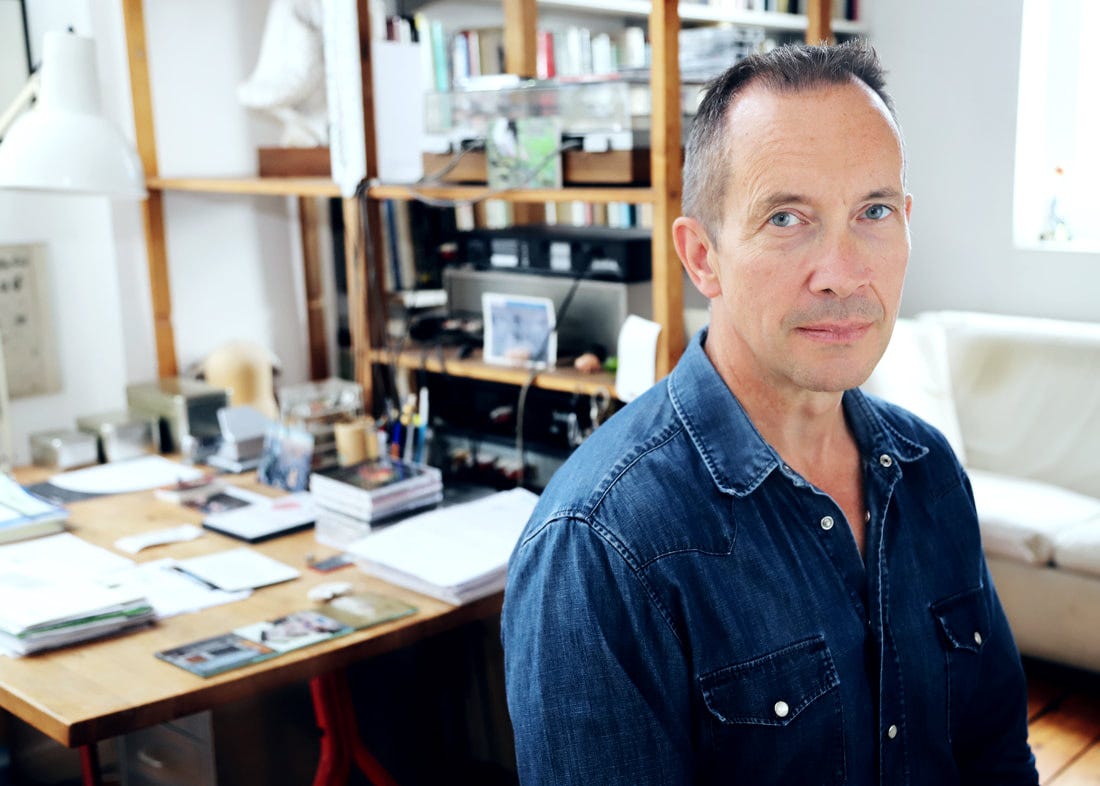
Jonathan Dove - Composer of Flight
Jonathan Dove’s music has filled opera houses with delighted audiences of all ages on five continents. He is one of the most performed living opera composers and few, if any, contemporary composers have so successfully or consistently explored the potential of opera to communicate, to create wonder and to enrich people’s lives. Jonathan Dove won the 2008 Ivor Novello Award for classical music and was made a Commander of the British Empire (CBE) in the Queen's 2019 Birthday Honours for services to music.
Ashley Daniel Foot - Host of Inside Vancouver Opera
Ashley is Vancouver Opera’s Director of Engagement and Civic Practice and host of Inside Vancouver Opera. Boundlessly creative and fascinated by the way that art is created and presented, Ashley has guided arts organizations across Canada to craft messages and tell unique stories.
Mack McGillivray - Audio Producer and Editor
Mack is an audio producer, creating shows for radio and podcast. He is passionate about cultivating local community and a lifelong lover of opera.


